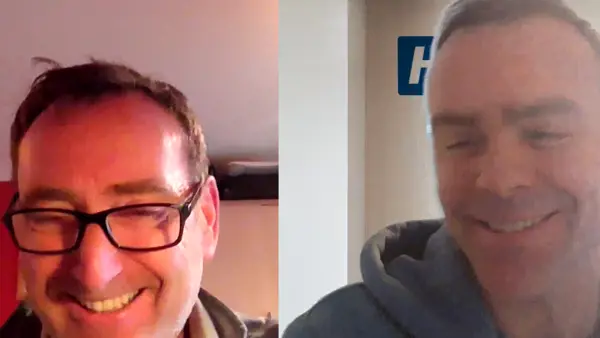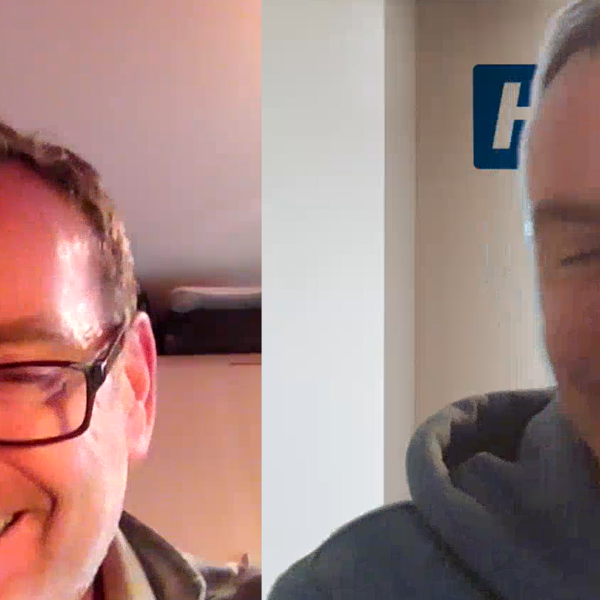Get more insight from HSO
Dynamics Matters Podcast Ep 36: Technology, the great 2022 enabler
With special guest David Little, Managing Director, HSO
✔ Why there's optimism for 2002 when it comes to technology
✔ David's big optimism for 2022
✔ Microsoft's focus for 2022

Podcast summary:
Technology, the great 2022 enabler
2022 is the year for optimism. This is the message from HSOs Managing Director David Little. He believes that organisations, and people, are now well over the shock of 2020. And have embraced the new working and living culture the pandemic (initially) forced upon society.
Transcript
Welcome everyone to the HSO Dynamics Matters Podcast.
Your regular sonic dive into the world of Microsoft technology related matters and much more besides.
I’m your host Michael Lonnon, and today I’m delighted to be joined once again by HSO Managing Director, David Little.
I was keen to grab David and his crystal ball … (ahem) to find out what his predictions are for 2022 when it comes to HSO, Microsoft, and wider business trends.
And, as usual, he doesn’t disappoint. Oh, and David closes this episode with a quite brilliant bonus tip that will ensure your 2022 is one not to forget.
So, grab a brew, sit back, relax, and enjoy the show.
Michael Lonnon
2022 optimistic or pessimistic, or perhaps middling
David Little
100% optimistic.
Michael Lonnon
What gives you such optimism David?
David Little
I think 2021 was a bit of a slog, actually, I think a lot of people in some ways feel it was more difficult than 2020.
Michael Lonnon
Personally, and professionally.
David Little
Yeah, I think both because 2021 didn’t quite realise the big opening up and the big kind of celebration of ‘everything’s back to normal’, because it wasn’t, we obviously still had Christmas last year that was still really restricted. We then went into lockdown again, and it never quite got going. I think the newness of it, there was a lot of people who experienced a lot of new things, and had a new perspective and everybody was in it together, but 2021 didn’t have that. It was like the long tail of the whole thing that everybody’s now really fed up.
Michael Lonnon
People have adapted a little bit to it, and they got used to it. I think 2022 is almost started as a year of recognition, that we are still not out of it and things are still a little bit the same.
In terms of HSO from a 2021 perspective, how was it?
Michael Lonnon
How was 2021 for HSO?
David Little
It was great. When we finished 2020 we had a lot of retail customers that were heavily impacted, but they then started investing really heavily and quickly. I think there was still a bit of uncertainty with the lock-down, for example we had one of our customers due to start a hospitality business, but they couldn’t start because they went back into a furlough situation at the beginning of 2021. But overall, it was big momentum and I think it’s set us up for the optimism that I feel for 2022.
Michael Lonnon
Do you think that optimism is because there’s more confidence from people?
David Little
There’s optimism I think, particularly when it comes to technology. And there’s a rush for people to invest. There’s a recognition that goes back to the middle of 2020, that people were investing too slowly. Whichever sector you’re in, even the sectors that may have thought we invest a lot of money recognised that they were going far too slowly. There’s been an acceleration. And the fact people are being forced to use technology to work differently, like working at home, has been given a place on the agenda. It’s now got a seat at the management table in a way that it didn’t traditionally have and that was something that was growing, but it’s been accelerated by COVID. People are now seeing that you can get things quicker with technology, it doesn’t have to be a slog, it doesn’t have to be a two-year programme. You need to invest in infrastructure, but you can get things quickly as well, you can make a quick difference to your business, and you can make it more flexible.
Michael Lonnon
Again, from an optimism and 2022, what excites you about the direction of HSO and the direction of Microsoft?
David Little
Our big optimism is the combination of very high demand in our existing markets, unprecedented demand, in many ways, not just in our existing markets, but also for new technology. Plus the fact we’re trying to break into new markets and new technologies at the same time. It’s the excitement of us being well positioned in the market, Microsoft’s place in the market, in a market that’s changing incredibly quickly and the demands of us having to change bring excitement, because business won’t just come to us. It’s like, can we run quickly, to keep up with this and to keep changing ahead of what customers are asking for because link back to the blog about the realisation that businesses now have coming with that as a very high expectation on delivering benefits. We’re having to do things differently. It’s not just about technology anymore.
Michael Lonnon
We were chatting about this earlier, in terms of Microsoft’s their technology direction overall. You mentioned something that Microsoft are conscious of – not trying to get too far ahead where they’re taking innovation. They want people to be able to use the things they’re creating now, to their full potential. Is that where you see 2022 being a focus for them?
David Little
Definitely. Coming to the second point first one of the big things we all need to achieve is we need to become more efficient at delivering technology and getting to a point where technology is delivering benefits. It’s still very much about there not being the economies of scale there need to be if we were in a mature market. One of the things I often do is reflect on what we do collectively in the technology industry compared to other markets. The fact we don’t template things, the fact we don’t have quick ways of doing things, we tend to still just do things on the basis of taking people days to do things. It’s going to take X hundreds of days to achieve things and then you move on to the next. Very quickly, what HSO will be doing is moving to a more templated and accelerated approach where customers can get benefits quicker and I think that’s what the industry is going to increasingly demand. If you roll forward a couple of years, it’s just going to become standard that people expect things to be done using a template with pre-loaded content to deliver stuff quicker.
How to make your new Microsoft project a guaranteed success
In 10 minutes, this brochure shows you how to launch projects in the quickest possible time, resolve mistakes and mishaps, and keep your ongoing costs to the barest minimum.

Michael Lonnon
Is this a David Little prediction for 2023/25?
David Little
I know from experience, predicting the time that things are going happen is pretty unwise, but I do think the change is inevitable. If you look at anything else is about content, it’s not just kind of doing a thing, it’s about delivering a result, and you can look at that from every sector in moving towards, I’ll sell you a product, but I’ll give you an end result. It’s the same in our industry. I often think about, TVs, for example, used to buy a TV, now effectively, the thing that people are buying is content through channels and obviously, the channels are now becoming content creators and have been for a while and that’s the way that they’re going to attract people. The industry has to go the way of us coming with solutions out the box, which means a very different approach to the way we do things now. It’s less about technical skills, and functional knowledge, it’s actually about leadership in the way we provide services to our customers,
Michael Lonnon
There’s a saying I like: ‘times change, people don’t’ and people are always going to be looking for value and benefits. So as long as that remains the focus in terms of whatever it is that we do as an organisation, that Microsoft have created in terms of technology, that’s the way forward; benefits for the end user, the customers.
David Little
100%. I’ve said for a while that the industry; and I’ve been in the industry for a very long time, for most of that time has not delivered to its promise. It’s been a series of upgrades and new technologies that haven’t delivered more flexible versions of the technology. Whether it’s delivered the benefits in the right ways, has been questioned, but that is the bit that’s now changing. This is what makes it exciting for us, as well as new technology dimensions, it’s new people skills, other services that enable us to land things better, like change management, business analysis skills, and those things.
Michael Lonnon
If there was a message you had to give to organisations considering any kind of technology change, or perhaps aren’t quite as far ahead of the curve as some who are taking advantage of new technology to deal with things like the pandemic, is there a message and a reason why you would suggest they perhaps look to move forward onto new technology and try and get off what they’re on at the moment?
David Little
The first thing is that very few companies are not saying that, whereas in the past most companies default position probably was inertia, I think it is now the opposite. It’s actually quite rare to find a business saying we’re going to stay put, there are one or two but it’s quite odd. You’d be taken aback if somebody said, no, we’re fine we’re not going to use technology to change our business. I don’t think people need a lot of urging in that sense but I’d certainly be urging people to think about the way they do it and embrace the concept of your infrastructure, thinking short term at the same time as long term. I’ve heard it referred to as bimodal IT which is about investing in the infrastructure, keeping the lights on and also making sure your infrastructure stays flexible. At the same time deliver quick benefits to the business. And I think you have to do both simultaneously. That’s what we’re finding more customers doing more projects in parallel, they’re not waiting to do a two-year ERP implementation. They want to deliver benefits as they go and that’s exactly as it should be.
Michael Lonnon
Here’s an interesting question, because as HSO has grown as an organisation, we’re not just an ERP organisation, we’re not just Dynamics 365, we are data analytics, we are the power platform, we are Microsoft 365 Do you think organisations can take little bits of value from each technology or do they need to put whole things in before they can move on to the next piece, and when do they start taking advantage of those different technologies?
David Little
I think it should be the former, the starting point should be I can pick and choose and that’s actually what Microsoft are trying to do. Whereas in the past, it used to be ERP plus. I need to get the platform and ERP was the kind of data foundation that it could do other interesting things on top of it, that’s not quick enough anymore. Microsoft are trying to dissemble the solution so that it is more modular, and you can do piece by piece. You can put in, for example, elements of ERP, plus power platform, and elements of the data verse, the foundation and then evolve that over time as you add more things. So that is an important way of doing things and the way to take advantage of that is to make sure you’ve got the right architectural direction, so that you know exactly where it’s going, so you don’t pin yourself into a corner. That’s a good example of new services that we provide, is we’ve got data architects and enterprise architects who can map that journey and say, yes, you can start with this smaller piece, but it will still fit into the overall picture, and you won’t find yourself basically inefficient in the future because you’ve gone in the wrong direction.
Michael Lonnon
So, if 2021 was the year of inertia, perhaps 2022 is the year of productivity and optimism. And in terms of optimism, David, how are you getting on with your New Year’s resolution? Did you have one?
David Little
Well, I was immediately going to correct you and say, what do you mean New Year’s resolution, I always have about 10, seriously. Covering every aspect of my life. So maybe this is an insight into my mindset, which is incremental improvements. I was talking to somebody yesterday, I think it was about dry January, and why I think it’s a bad idea. Apart from the fact that it’s impossible for me to do as a Scotsman, because burns night is on the 25th of January, I do actually think it’s a bad idea because you attempt something that’s too big and even if you succeed, what people then do is they then do a blow out, so it doesn’t create better habits. What I try and do is just nudge everything along. There’ll be something to do with time management, health, diet, sport, and leisure, just holidays everything really. Incremental improvements.
Summary
There were many great insights in today’s episode, but I want to pick up on three that resonated with me.
The first is that David believes 2022 will see organisations adopt a more templated approach to technology adoption. He believes it’s this approach that will see the end of 2-3 year technology projects, delivering faster benefits. And even allowing projects to be run side by side.
The second is that Microsoft will continue to break their platform into modular components, again, so organisations can get solutions and value faster.
The last is that we may see the pace of innovation slow a little as Microsoft increase focus on helping organisations increase, and improve, the use of the innovative tools already at their disposal.
And there you have it, David’s 2022 predictions for what should be a great year ahead. I hope you enjoyed this episode, until next time, take care of yourselves.
Contact us
Submit your contact details and we'll be in touch


